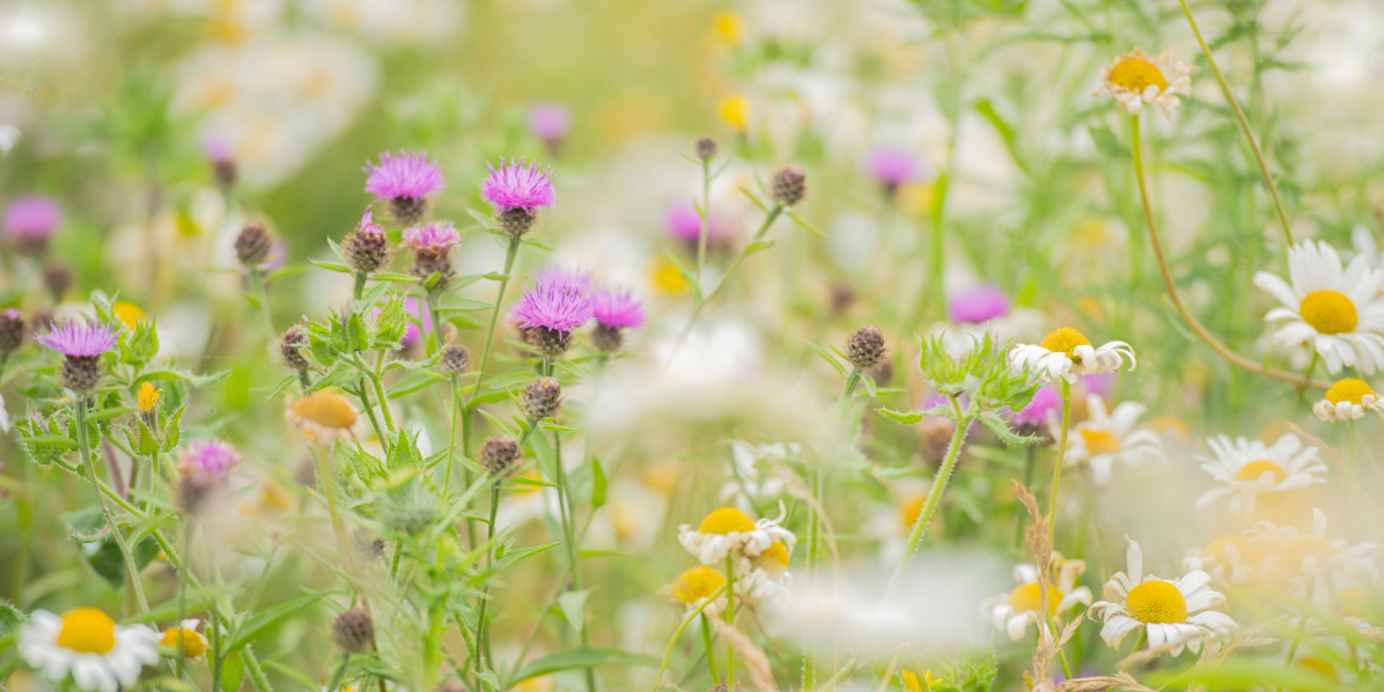Wildflower Walking
In summertime, wildflower meadows are in bloom and hum with life; insects feeding and nesting amongst majestic flowers and grasses bursting with colour. Our countryside was once full of meadows satiated with a gorgeous variety of flowering plants, supporting butterflies, insects, farmland birds and other wildlife. But since the 1930s, we have lost over 99% of these incredible places, and those that are left are fragmented. Wildflowers are essential to pollinating insects, and further loss of this floral landscape will have a huge impact on a vast array of nature, including our own food chain. Seek out some wildflowers this summer; you can find them in meadows, woodland, moorland, gardens, grass verges, and even on the beach.
Where? You can find wildflowers at a huge variety of RSPB reserves all over the country – find your closest one here. Machair is a rare coastal habitat which transforms into a jewelled carpet of wildflowers, but it requires a trip to the Outer Hebrides – if you’re lucky enough to go island hopping then come visit our Balranald reserve and learn more about this incredible and rare habitat.
Hummingbird hawkmoths
From flowers to insects, summer is the time to see some spectacular and unusual invertebrates. Every year, many people are taken aback as they see in their garden what appears at first sight to be a hummingbird hovering among the flowers. A closer look unmasks this imposter as a hummingbird hawkmoth, a day-flying moth with a wingspan of about two inches. It is very swift on the wing and an expert hoverer. The wings beat so rapidly that they produce an audible hum and can be seen only as a haze. The darting movement from one flower to the next with the long proboscis uncoiled completes the illusion of a hummingbird. They spend the summer in the UK, with a late summer peak in numbers.
Where? Hummingbird hawkmoths have been recorded in every county in the UK, including as far north as the Orkney and Shetland Islands. Parks and gardens rich in flowers that provide a plentiful supply of nectar offer the best chance of seeing them.

Wildflower meadow at RSPB Ouse Fen Nature Reserve. Credit: Ben Andrew, rspb-images.com

Grey seal pup nose to nose with its mother in Norfolk. Credit: Ben Andrew, rspb-images.com

Marsh harriers in flight fighting over prey, RSPB Leighton Moss Nature Reserve. Credit: Ben Hall, rspb-images.com

Sunset Walk at RSPB Titchwell Marsh Nature Reserve. Credit: Rahul Thanki, rspb-images.com
Sunset bat watching
It doesn’t necessarily have to be the daytime to experience summer’s nature; sunset and after dark is the perfect time to spot some of the UK’s 18 species of bat. Bats roost in a variety of different places, from holes in trees to buildings such as churches, to caves, mines and railway or canal tunnels. But as old trees are cut down, buildings disturbed and mines filled in, bats are left with very few natural roost sites. Putting up a bat box gives these night-time creatures somewhere safe to roost, raise their pups and sleep during the day. Making sure our gardens are thriving insect-rich feeding grounds for bats can also help, and means you don’t have to go too far to experience the spectacular sight of them swooping and diving.
Where? Join one of our bat watching events at an RSPB reserve to learn more about them, or just go for a sunset stroll around your neighbourhood to see if you can spot any. There are three usual suspects that we’re most likely to see in our gardens; Noctules, Daubenton’s bats and Pipistrelles.
These are just three of the wonders that nature in summer can offer. Look up to the skies and witness the spectacular sight of marsh harriers engaging in aerobatic food passes; duck and dive as nesting swallows and swifts career between buildings; take a trip to the coast to go rock-pooling or view seals, whales and dolphins, or experience the incredible sight and sound of thousands of seabirds nesting on cliffs. Summer offers the best chance to immerse yourself in nature and see some truly wonderful things, so take the opportunity and see what you can experience!
New to Triodos Bank?
If you open a Personal Current Account with Triodos and select ‘RSPB’ when asked how you heard about the bank, we’ll donate £60 when your balance reaches £100. Eligibility, terms and conditions and a £3 monthly fee apply.
Already bank with us?
If you already bank with Triodos, we’ll donate £25 directly to the RSPB for each new Triodos Current Account customer who joins on your recommendation. Your recommended friends can choose to donate £60 to the RSPB too (so a potential donation of £85 between you) Eligibility, terms and conditions and a £3 monthly fee apply.

Thanks for joining the conversation.
We've sent you an email - click on the link to publish your post.